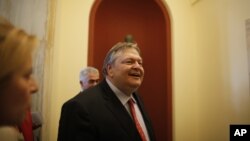Greek conservative leaders say they expect to form a new coalition government with the Socialists Tuesday.
Socialist leader Evangelos Venizelos, whose PASOK party finished third in Sunday's parliamentary elections, says talks with the conservatives must be wrapped up by the end of the day.
Greece's president gave conservative chief Antonis Samaras three days to form a coalition government. His New Democracy party won 129 of the 300 seats in parliament. The radical leftist and anti-bailout Syriza party came in second with 71 seats. PASOK, which backs the bailout, won 33 seats.
Syriza leader Alexis Tsipras is refusing to be a part of the coalition. He says Greece needs to have a strong opposition and says history will prove that the bailout and its sharp spending cuts was wrong for Greece.
New Democracy and PASOK have been the only ruling parties Greece has known since the end of military rule in 1974. The Democratic Left party, which also opposes the bailout and finished sixth Sunday, may also play some part in the coalition, possibly to assure skeptical Greeks that Sunday's election will not result in just more of the same.
At the G20 summit in Los Cabos, Mexico, U.S. President Barack Obama says the Greek election indicates a positive prospect for Greece, not only for a new government, but for the Greek people to have the chance to succeed and prosper.
European Council President Herman Van Rompuy and European Commission President Jose Manuel Barroso say the European Union looks forward to working with the new Greek government and supports efforts to put Greece's economy on a sustainable path.
Sunday's vote came after last month's election failed to bring about a new government.
Germany, Europe's biggest economy and a major contributor to Greece's two multi-billion-dollar bailouts, suggests Greece could get more time to comply with sharp spending cuts as required by the bailouts. New Democracy has promised to renegotiate the harsh austerity conditions demanded by the European Union and International Monetary Fund.
The monetary crisis in Greece exploded in 2009 and set off a chain reaction across Europe. Greece is now in its fifth year of recession, with unemployment more than 22 percent. Greeks have filled the streets in often violent protests against the austerity drive, which includes spending cuts, tax hikes, and firing thousands of civil servants.
